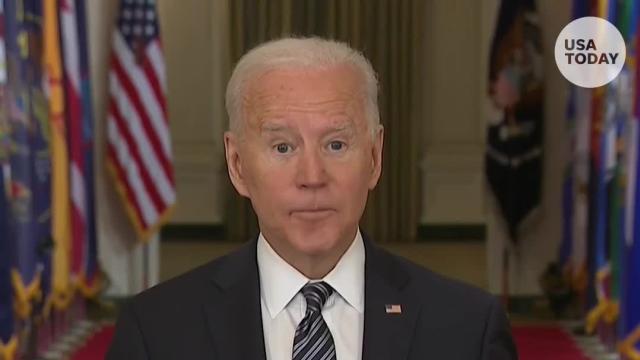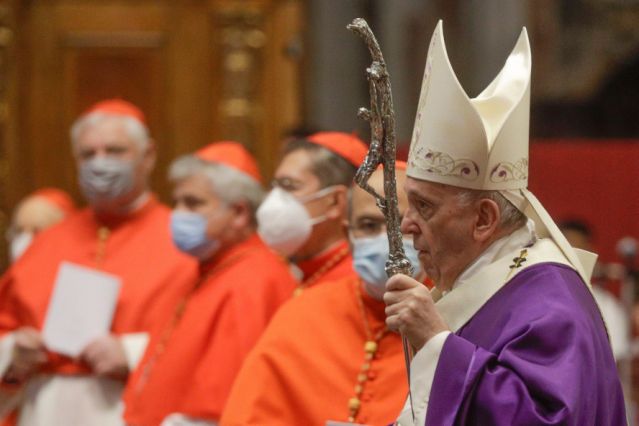Catholics might be somewhat confused by reports on differing messages about the acceptability of the Johnson & Johnson COVID-19 vaccine due to a cell line from an abortion being used in its production.
The differences have been resolved and Catholic teaching is clear: Catholics have a moral duty to protect themselves and others from COVID-19 by being vaccinated. However, if given the choice, they should avoid the Johnson & Johnson vaccine, according to the Vatican and the U.S. Conference of Catholic Bishops
Should they choose not to be vaccinated, they have a moral obligation to mask, socially distance and “do their utmost” to avoid becoming infected or infecting others, the Vatican said.
The message was somewhat garbled when the Diocese of Bismarck in North Dakota issued a statement March 2 saying the Johnson & Johnson vaccine was “morally compromised and therefore unacceptable” to be given or received by Catholics.
“The local bishop is taking a harder stance than either the U.S. Council of Catholic Bishops or the Vatican,” said Dr. G. Kevin Donovan, a Catholic bioethicist at the Pellegrino Center for Clinical Bioethics at Georgetown University Medical Center.
What does victory against the COVID-19 pandemic look like? USA TODAY’s vaccine panel weighs in
A week ago, however, the Bismarck Diocese walked back its initial hard line.
“The Catholic Church’s concern about the Johnson & Johnson vaccine is that it is morally compromised as a cell line from aborted fetal tissue was used in its development and production,” said Father Robert Shea, diocesan ethicist for health care. “As the U.S. Bishops’ statement on the Johnson & Johnson vaccine indicates, it is possible to receive it in good conscience if given no other choice, but it should be avoided if there are alternatives (like Pfizer or Moderna) available.”
A December statement from the Vatican’s Congregation for the Doctrine of the Faith made clear the overarching moral mandate is to be vaccinated.
Related: President Biden asks Americans to get vaccine this spring there’s a good chance
you, your families,

Scroll back up to restore default view.
When “ethically irreproachable” COVID-19 vaccines are not available, “it is morally acceptable to receive Covid-19 vaccines that have used cell lines from aborted fetuses in their research and production process,” the statement said.
Neither the Pfizer or Moderna vaccines are entirely free from moral quandary as both used fetal cells from an abortion for early testing, though not in the actual production of the vaccine.
Pope Francis and Pope Emeritus Benedict XVI both received their first doses of the Pfizer vaccine on Jan. 13.
Catholics’ duty is to protect “the common good,” the Vatican statement said. The vaccines “can be used in good conscience with the certain knowledge that the use of such vaccines does not constitute formal cooperation with the abortion from which the cells used in production of the vaccines derive.”
Father Tad Pacholczyk, director of education with the National Catholic Bioethics Center, notes Catholics have an obligation to voice their concerns, whichever vaccine they get.
“End users have a duty to push back and make known their disagreement with the continued use of these cells by researchers in the pharmaceutical industry and academia,” he said.
That can include writing letters to the companies, posting on social media or writing letters to the editor, he said.
It’s certainly permissible for an individual to refuse a vaccine they find morally problematic, Donovan said. But they are then obligated to do whatever they can to reduce the risk of transmitting COVID-19 to themselves or others.
That would include masking, social distancing and hand-washing.
“That’s something that shouldn’t be missed,” said Donovan. “We have a moral obligation to not only take care of our own health but to protect others whenever possible and by whatever reasonable means are available.”
His statement echoed the Vatican, which said people who refuse vaccines produced using cell lines from aborted fetuses have a responsibility to protect others.
They must “do their utmost to avoid, by other prophylactic means and appropriate behavior, becoming vehicles for the transmission of the infectious agent.”
The issue is over the PER.C6 cell line, which came from retinal cells from an 18-week old fetus legally aborted 36 years ago in the Netherlands.
In the Johnson & Johnson vaccine, the cell line is used to help to create the vaccine but isn’t actually in the vaccine, said Dr. Paul Offit, director of the Vaccine Education Center at Children’s Hospital of Philadelphia.
“It’s in the vat; it’s not going into your arm,” he said.
He added, “To wait for a vaccine from Pfizer or Moderna is a choice to take an unnecessary risk, one that could harm others.”
This article originally appeared on USA TODAY: Johnson & Johnson COVID vaccine OK for Catholics, if it’s the only one














